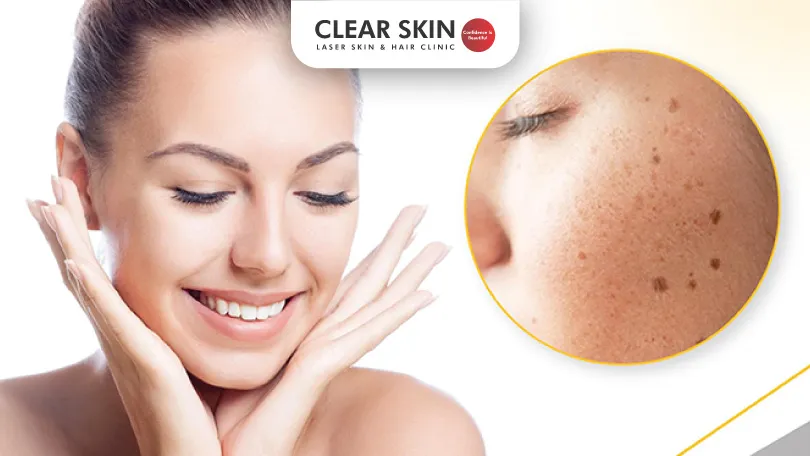Best Treatments for Pigmentation on Face: Clear Skin Solutions
Reviewed By: Dr Dhanraj Chavan
Updated on: 23 July, 2025

Want even-toned, clear skin? Explore the best remedies and treatments for facial pigmentation and start your journey to brighter skin today
Table Of Content
- Common Causes of Facial Pigmentation
- Preventive Measures for Pigmentation
- Topical Treatments for Pigmentation
- Chemical Peels: Exfoliating for Clarity
- Laser Therapies: Targeted Pigment Removal
- Microdermabrasion: Polishing Your Skin
- Combination Therapies for Optimal Results
- Professional vs. At-Home Treatments
- Consulting a Dermatologist: Personalized Solutions
- Conclusion
Common Causes of Facial Pigmentation
Facial pigmentation happens when some areas of the skin become darker than others. This can make the skin look uneven. Here are the main reasons why it occurs:
1. Too Much Sun Exposure
The sun is the biggest cause of skin pigmentation. Spending too much time in the sun can trigger your skin to produce extra melanin – the pigment that gives skin its colour. This can lead to dark spots forming over time.
2. Hormonal Changes
Changes in hormones can cause a type of pigmentation called melasma. This is common during pregnancy or when taking birth control pills. It often shows up as brown or grey patches on the face.
3. Skin Injuries or Conditions
Pigmentation can also happen after the skin has been irritated or damaged. This is called post-inflammatory hyperpigmentation. It can occur after acne, cuts, or even skin conditions like eczema or psoriasis.
By understanding these causes of pigmentation, you can take steps to protect your skin and prevent pigmentation from worsening. Wearing sunscreen, staying hydrated, and treating underlying skin issues can all help.
All About Skin Pigmentation (स्किन पिगमेंटेशन कारण और उपाय) | ClearSkin, Pune
Preventive Measures for Pigmentation
Consistent sun protection is required to prevent pigmentation. Broad-spectrum sunscreen, protective clothes, and minimising sun exposure can help greatly to minimise the risk. Hormone management and avoiding harsh skincare products can also assist.
Topical Treatments for Pigmentation
Some over-the-counter lotions can help fade light pigmentation over time. Look for products that contain ingredients like hydroquinone, retinoids, vitamin C, or niacinamide. These ingredients work by lightening dark spots, making your skin tone more even.
Keep in mind, these treatments do not work overnight. It may take several weeks or even months to see a change. For the best and safest results, it’s always a good idea to talk to a dermatologist or skin care professional before starting any new treatment. They can suggest the right products for your skin and help you get the best outcome.
Chemical Peels: Exfoliating for Clarity
In chemical peels, the top layer of skin is scrubbed away to reveal a complexion that is smoother and more evenly toned. Several peels target different levels of pigmentation.
Laser Therapies: Targeted Pigment Removal
Laser treatments use focused light energy to target and break down pigmented cells in the skin. These cells are responsible for dark spots, discolouration, or uneven skin tone.
Once the laser breaks them down, your body’s natural processes step in to gradually remove the damaged cells, leaving your skin clearer and more even over time. This process is safe and effective but typically requires multiple sessions to achieve the best results. The number of sessions needed can depend on the size and depth of the pigmentation being treated.
Microdermabrasion: Polishing Your Skin
Small exfoliating crystals are used in microdermabrasion to exfoliate the top layer of skin, effectively curing minor pigmentation. There is no recovery time needed because it is non-invasive.
Combination Therapies for Optimal Results
Dermatologists frequently advise combining therapies for better outcomes. For instance, different layers of pigmentation can be treated with a combination of laser therapy and chemical peels treatment.
Professional vs. At-Home Treatments
Even while there are solutions that may be used at home to cure some pigmentation problems, professional treatments provide more pronounced and long-lasting benefits. The best course of action can be determined by seeing a dermatologist.
Consulting a Dermatologist: Personalized Solutions
Every individual’s skin is unique, requiring personalised treatment plans. A skin specialist in Pune can assess your specific pigmentation concerns and recommend a tailored approach. After undergoing pigmentation treatment, it’s crucial to maintain results by adhering to a proper skincare routine and using sun protection to prevent further pigmentation..
Do You Know?
Roughly 250 Patients Are Treated
Everyday By These Dermatologists
(You are one click away from flawless skin)
Meet Our Dermatologist?
Conclusion
Dealing with pigmentation on the face can be challenging, but with the array of effective treatments available today, achieving clearer and more radiant skin is within reach. From topical solutions to advanced therapies, taking the right steps toward treating pigmentation can significantly affect your complexion.
Consider contacting Clear Skin Clinic for expert advice and practical solutions suited to your individual skin needs. Their unique approach to Skin Pigmentation Treatment combines years of experience with the most recent advances in dermatology.
Further Reading
Why Pune’s Climate Triggers More Acne Breakouts Than Other Cities
Discover how Pune’s air pollution with PM2.5 levels 8.5x above safe limits worsens acne. Dr. Dhanraj Chavan shares dermatologist-approved protection strategies and treatment options.
Best Age for Anti-Ageing Treatments
Understand when to start anti-ageing treatments. Expert skincare guide for your 20s, 30s, and 40s from Clear Skin dermatologists in Pune.
How to Get Rid of Acne Scars Fast?
Safe acne scar treatment for Indian skin tones. Dermatologist-planned procedures to reduce scars and improve skin texture.
Does Pune’s Air Pollution Worsen Acne? Dermatologist Insights
Discover how Pune’s air pollution with PM2.5 levels 8.5x above safe limits worsens acne. Dr. Dhanraj Chavan shares dermatologist-approved protection strategies and treatment options.
Have thoughts? Please let us know
We are committed not only to treating you, but also educating you.





